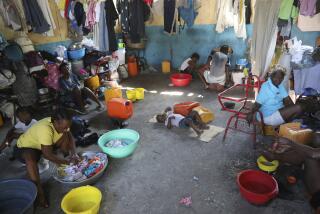Portugal is stark example of EU’s hunger plight
- Share via
LISBON, PORTUGAL — Maria de Assuncao Cunha and her two small boys come out of a hilltop church carrying a handout of rice, cereals, milk and cookies.
“It helps a little bit, but it’s not enough by a long way,” says the 43-year-old, who has three children ages 5 to 14. “Things are just really, really tight.”
The mothers, elderly people and middle-aged men standing in line at the Church of the Sacred Family in Lisbon offer grim evidence of how the economic crisis is hurting one of the world’s wealthiest continents.
The European Union, long a giver of aid to less-developed nations, is turning its attention to its own needy citizens. The bloc’s farm ministers are considering a 67% increase in internal food aid, to $631 million a year. A decision is due this month.
Officials estimate 43 million people in the 27-nation bloc -- about 8.5% -- cannot afford a balanced nutritional meal, including some type of meat, at least every other day.
“This is completely unacceptable,” European Social Affairs Commissioner Vladimir Spidla said recently.
The Portuguese are especially vulnerable.
Portugal is Western Europe’s poorest country. The minimum monthly wage, taken home by several hundred thousand workers, trails the rest of the region at just $538 before tax.
Rising interest rates punished families with debt, which ran at 129% of household income last year -- the second-highest among the 15 countries using the euro. And, according to the government, 1 million older people have to get by on pensions of less than $380 a month.
Yet prices are comparable to those in wealthier EU countries.
Cunha, one of more than 150 people receiving relief in a parish stacked with tall apartment blocks, is unemployed and on welfare. Her husband works in the construction industry, where jobs are increasingly scarce. Together they bring home slightly less than $900 a month.
“How can a family of five live on that much nowadays? You can’t,” she says. “Things have been getting worse and worse.”
The country’s economic woes began at the end of the past century. Portugal had stuck too long with an economic development policy based on cheap labor costs and failed to prepare for competition from developing nations. Economic growth this century has averaged only around 1% a year.
Julio Paiva, a Portuguese who sits on the executive committee of the Brussels-based European Anti-Poverty Network, says the crisis is felt much more keenly here than elsewhere in Western Europe.
An EU study in July found that 71% of Portuguese had difficulty paying their monthly bills.
The government is digging deep to find extra welfare payments for the poor, including more than 160,000 elderly. But with the country generating little wealth, there’s a crunch on state finances.
Charities are taking up the slack.
Much of the aid comes from the Food Bank, a volunteer organization that collects unsold products donated by retail chains and wholesale markets. The Portuguese Food Bank is the largest on the continent.
The Lisbon operation, one of 14 nationally, is run out of three warehouses converted from train sheds. Each morning food is stacked up for delivery to more than 300 centers around the Atlantic port city. More than 60 other centers are on a lengthening waiting list.
The center provides help for 67,000 people in the Lisbon metropolitan area, sending out 35 tons of food every weekday, mostly to suburbs where the economic downturn has exposed pockets of poverty.
When it opened in 1992, the Food Bank mostly helped old people. But now families squeezed by soaring prices and debt are joining them, says head Isabel Jonet.
“They’re the new poor. These are people who have a job, a wage, but still can’t meet their family’s needs,” she says.
Jonet says requests for help have increased “exponentially” over the last six months. And she expects the plight will worsen as companies scale back their production and less surplus stock reaches the Food Bank.
“Next year is going to be very tough,” she says. “I don’t doubt that for a minute.”
More to Read
Sign up for Essential California
The most important California stories and recommendations in your inbox every morning.
You may occasionally receive promotional content from the Los Angeles Times.













